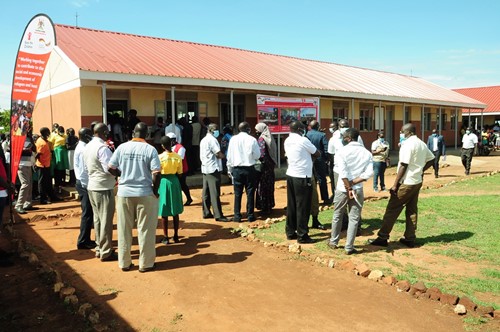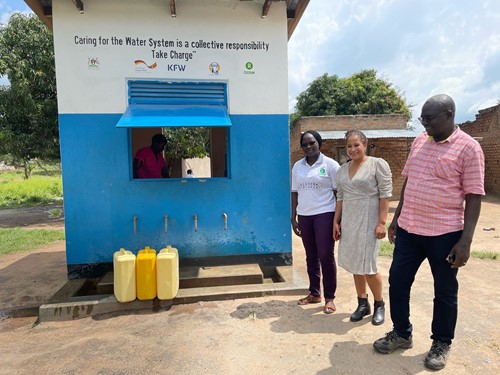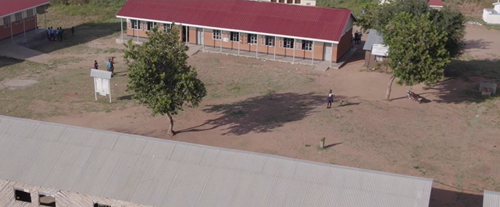Project
A positive impact in the education and WASH sector for refugees and host communities in Northern Uganda

Project
Initiated at a time when the influx of refugees into Uganda was at its peak, after more than five years of implementation, the German-funded Refugee Response Fund has delivered significant results for refugees living in the Bidi bidi and Rhino Camp and the host communities.
“We’ve had a very smooth, successful implementation of this project, and as we come to the end we see that everyone is happy and positive about its contribution, which has led to social cohesion within the region.”
Douglas Asiimwe, Acting Commissioner for Refugees, Office of the Prime Minister
The right to a dignified life, with ample opportunities for growth and freedom from the threat of violence, belongs to every person. Regrettably, many people in unstable and war-torn regions have to flee from their homes due to armed crisis. Others leave due to the severe lack of opportunities in their regions. For whatever reason, people are driven to such lengths that they are willing give up everything they have known in order to survive in a different place.
As refugees leave their home countries, neighboring countries have taken on the commitment of hosting them. With its open-door refugee policy, allowing refugees the right to work and enjoy significant freedom of movement, Uganda has become a primary destination for those fleeing conflict in the Democratic Republic of Congo, Burundi and South Sudan. At present, Uganda hosts over 1.46 million refugees, and an estimated 100 people cross into the country every day.

An internationally recognized model for response
Contributing to the Government of Uganda’s Settlement Transformation Agenda, RRF was coordinated by Uganda’s Office of the Prime Minister, with support from NIRAS as the implementation consultant contracted to manage the grant and supervise its intervention projects. Two NGOs – Save the Children International and Oxfam – were selected to implement the social and economic infrastructure projects on the ground. RRF involved collaboration beyond these players, including other international and local NGOs, consultancies, national and local governments as well as other relevant stakeholders such as technical ministries.
Two sites in northern Uganda were chosen for the interventions: the Bidibidi settlement in Yumbe district and Rhino Camp settlement in Madi Okollo and Terego districts. These settlements are largely populated by people fleeing conflict in South Sudan; South Sudanese people represent 57% of all refugees in Uganda. There have been many challenges at Bidibidi and Rhino Camp. Before the RRF, access to basic necessities such as functional latrines, hand-washing facilities and drinking water had been limited. Classrooms were also overcrowded, with some children having to be taught outdoors. Incidence of waterborne diseases and school dropout rates were high. Given the alarming situation, the RRF sought to address these critical issues through infrastructure projects and an education programme that would bring about positive change in the lives of refugees and host communities alike.
people received access to a new drinking water connection
of women and girls in the project area spend <30 minutes per trip collecting water
children have access to improved education opportunities

At the Rhino Camp settlement, access to clean water was a primary concern, and Oxfam was tasked with developing water infrastructure for the settlement and its host communities in Madi Okollo and Terego. The water infrastructure has gone a long way towards helping community members who have needed it the most. “Before settling here, I had a lot of challenges in accessing clean water because of my illness that had immobilised me,” shares Evelyn Achan, one of the refugees at the settlement. “When the project began, I was the first person to request for water to be brought closer. My son went and requested for a water source, which was done and is now helping me.”
Now, Evelyn is able to access water from a tap less than five metres outside her house. “Thank you for bringing this water, and improving my life,” she says. “A load has been lifted from my son’s shoulders because I can now fend for myself with a closer source of water.”
Increased access to water has also been vital for health in all of the affected communities. “Before the RRF was initiated, there were many disease outbreaks. For example, cholera, hepatitis and water-borne diseases in general,” says Olama Taban, acting chief of Pawor sub-county in Madi Okollo. “When the water was actually put right, and people started using the [clean] water, those cases were reduced and became controllable.” Altogether, there has been a 13.5% decrease in incidence of water-borne diseases in the region.
Increased access to water has also had a welcome, if unexpected, development in promoting gender equity. Collecting water for household use is part of the daily routine of most young women, so closer proximity to water sources means this task has become much easier for them. This has led to a 24% decrease in the number of girls who spend over 30 minutes a day collecting water. All in all, the project reported a 21% decrease in girls dropping out of school since its intervention.

In Yumbe district, closer to the South Sudanese border, Bidibidi settlement is the largest refugee settlement in Uganda and – up until 2017 – was the largest in the world. Here, Save the Children implemented interventions to facilitate quality learning for refugee and host community children. Prior to the project, lack of infrastructure was a major challenge facing schools, causing overcrowding and lack of access. Many classrooms were also semi-permanent structures built of light materials that were vulnerable to bad weather. Under the project, 105 permanent classrooms were constructed in various schools, all designed to be accessible for disabled persons, and 16 accommodation units for teachers were built on school premises.
One of the major successes of the project was the creation of the Twajiji Hope Primary School, which was built to take younger students from Twajiji Main that had well over 5,000 enrolments from all over the district. Many students also faced the challenge of coming a very far distance for studies and going home late. The construction of Twajiji Hope has helped to alleviate many students’ difficulties.
“There has been a big change,” says Maritiyel Patrick, head teacher at Twajiji Hope. “The school learning areas have become spacious enough for learning. Classrooms are now comfortably occupied by the learners. Teachers feel that they are also delivering the right information in the right space … A child feels comfortable to sit in the classroom and continuously study. The tendency of leaving the classroom has been reduced and attendance has greatly improved.”
Apart from infrastructure, other interventions included providing training for 208 teachers in accelerated learning programme methodologies and other continuous learning approaches. This has directly led to the successful re-entry of 952 former school drop-outs aged 10-18 into mainstream schooling. The accelerated education programme had even attracted some young adults over 18 years of age who had previously been uncomfortable to return to classes where they had dropped out.

The project at a glance
“[The Refugee Response Fund] has done a lot, in terms of change, especially in the water sector. Currently our estimate of the population being served by these sites is 25,000. That is not a simple achievement, what it means for a population of 25,000 getting clean water. It is a lot for us as government.”
Humphrey Benson Otim, Chief Administrative Officer, Terego District
A programme of this scale is only possible with the concerted effort of many different parties, and as it has come to its end, its continued success hinges on continued commitment from the remaining stakeholders involved.
“We are looking at the sustainability of the services that have been initiated through the project, and these services will continue,” says Nelson Balyeku, the RRF’s Focal Point from Uganda’s Office of the Prime Minister. “For the water facilities, we are integrating the water systems into the government systems. We have already brought the Ministry of Water and Environment on board using their umbrella bodies to be able to manage the maintenance and operations.”
“For the education infrastructure, together with other infrastructure that are outside the project results, we are also integrating them into the Education Ministry, so they are also taken over by the government,” Nelson continues.
The RRF programme looks set to sustain its achievements through the Ugandan Government’s continued support from the top level to the ground. This is possible due to the recognition they have placed on the value and positive impact the RRF programme and its projects have had on the lives of the refugees and host communities at the intervention sites.
Download this content in PDF form
